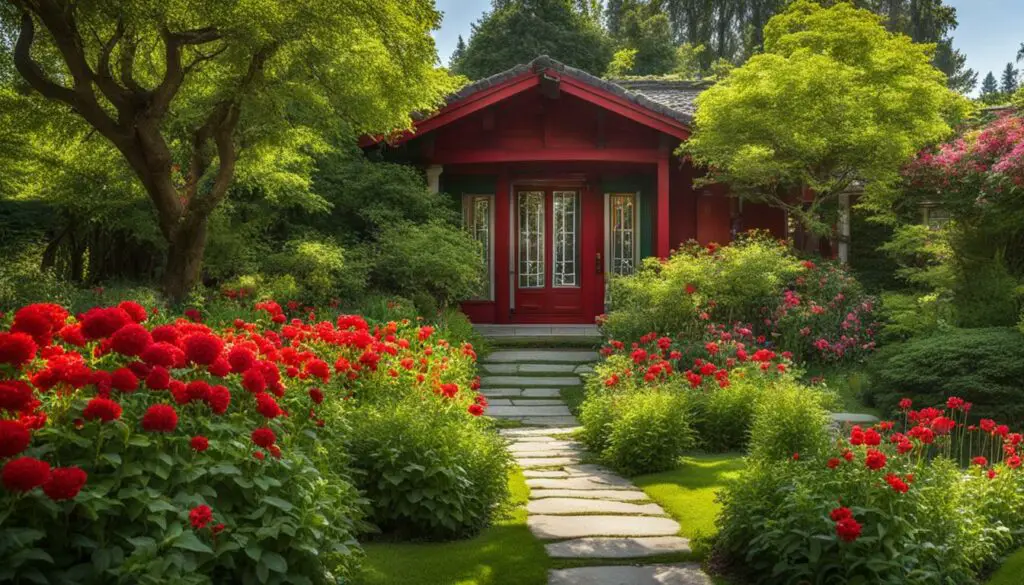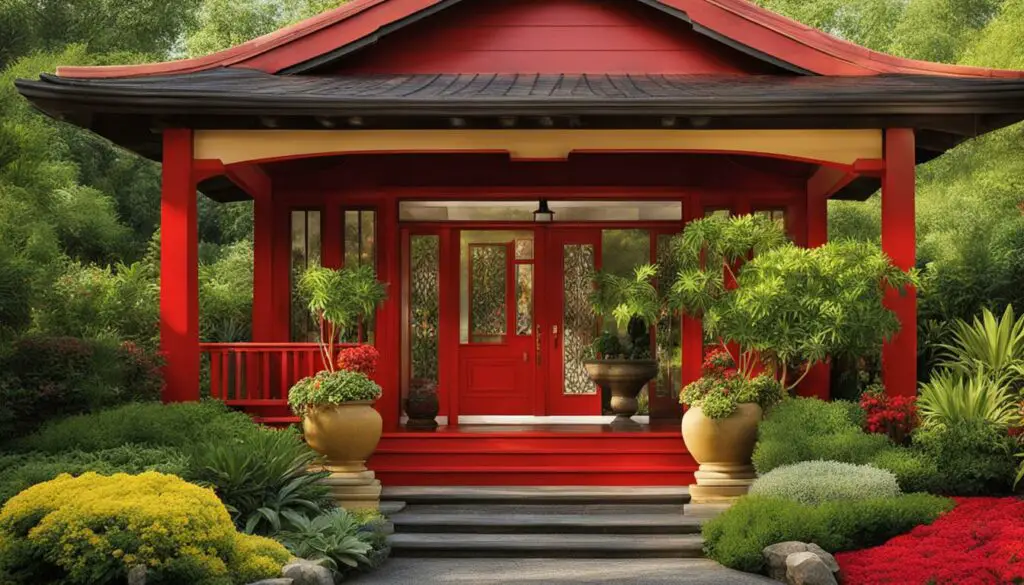Originally posted on October 28, 2023 @ 11:44 pm
Welcome to our comprehensive guide to the world of Feng Shui. Are you wondering whether your house facing north or south has an impact on the energy flow and overall well-being in your home? In this guide, we will explore the principles and guidelines of Feng Shui for house direction and how it can help you create balance, harmony, and prosperity in your living space.
Key Takeaways:
- Understanding the importance of house orientation in Feng Shui
- Exploring the unique qualities and benefits of north and south-facing houses in Feng Shui
- Assessing your house’s orientation and implementing Feng Shui principles to optimize energy flow
- Incorporating Feng Shui cures and enhancements for a balanced and harmonious living space
- Debunking common myths and misconceptions of Feng Shui house orientation
Understanding the Importance of House Orientation in Feng Shui
Before we dive into the specifics of whether a house facing north or south is better for Feng Shui, it’s important to understand the significance of house orientation in this ancient practice. In Feng Shui, the direction your house faces can influence the flow of energy, or Chi, in your home. This energy is believed to have a profound impact on your well-being, relationships, and overall success in life.
According to Feng Shui principles, there are eight compass directions, each associated with specific elements, colors, and energies. The eight directional sectors are North, South, East, West, Northeast, Northwest, Southeast, and Southwest. Identifying the precise orientation of your home is the first step towards optimizing the energy flow to align with your goals.
The Four Cardinal Directions in Feng Shui
Among the eight compass directions, the four cardinal directions, North, South, East, and West, have a special significance in Feng Shui. Let’s take a closer look at each:
North
In Feng Shui, the north is associated with the element of water and the color blue. It’s believed that north-facing homes can benefit from the grounding and stabilizing energy of water, which can help promote relaxation, clarity, and a sense of calmness. The north also represents career and path in life, making it an ideal direction for those seeking upward mobility and career success.

South
The south is associated with the element of fire and the color red. South-facing homes are believed to exude a vibrant and welcoming energy, making them ideal for socializing and entertaining. The south also represents fame and reputation, making it an ideal direction for those seeking recognition and respect.
East
The east is associated with the element of wood and the color green. East-facing homes are believed to promote growth, vitality, and health, making them ideal for those seeking to improve their overall well-being. The east also represents family and community, making it an ideal direction for fostering relationships and strengthening family bonds.
West
The west is associated with the element of metal and the color white. West-facing homes are believed to promote clarity, purity, and precision, making them ideal for those seeking to improve their focus and productivity. The west also represents creativity and children, making it an ideal direction for those seeking to cultivate their artistic talents or expand their family.
Keep in mind that these are just generalizations and that the specific energies and characteristics of each direction can vary depending on factors such as the year, the season, and the nature of the surrounding environment.
Understanding the significance of house orientation in Feng Shui is a crucial first step towards optimizing the energy flow in your home. In the next sections, we will explore the unique qualities and benefits associated with north and south-facing houses and learn effective strategies to maximize the positive energy flow in our living spaces.
The Power of North Facing Houses in Feng Shui
If your house is facing north, you can take advantage of its unique qualities and benefits to optimize the Feng Shui energy and create a harmonious environment that promotes abundance and tranquility.
The Compass Direction
In Feng Shui, north represents the water element, symbolizing career and life path, and is associated with the color black and the winter season. If your house faces north, you should focus on creating balance by contrasting the water element with the earth and fire elements.
Here are some essential north facing house Feng Shui tips to follow:
| Tip | Description |
|---|---|
| 1 | Decorate with black or blue accents |
| 2 | Add earth element décor, such as ceramics or terra-cotta |
| 3 | Use mirrors to reflect natural light and expand space |
| 4 | Introduce the fire element with candles or lamps |
| 5 | Avoid too much water imagery or elements, such as fountains or aquariums |

By incorporating these North facing house Feng Shui tips into your home décor, you can achieve a balanced and prosperous living space that supports your career and life path.
Unlocking the Potential of South Facing Houses in Feng Shui
If you’re fortunate enough to have a south-facing house, you have the potential to create a warm, welcoming environment that inspires positivity and abundance. But, as with any orientation, there are specific rules and guidelines to follow to optimize the Feng Shui of your home. Here is a comprehensive guide to help you unlock the potential of your south-facing house:
Understanding the Importance of House Orientation in Feng Shui
Before we delve into the specifics of south-facing houses, it’s important to understand the significance of house orientation in Feng Shui. Your home’s direction plays a crucial role in the energy flow throughout your living space. By understanding the principles of Feng Shui, you can optimize this energy flow to create a harmonious and balanced environment.
The Power of South Facing Houses in Feng Shui
South-facing houses are associated with the element of fire and are believed to bring warmth, passion, and energy to your living space. They tend to have a bright, well-lit atmosphere, making them perfect for entertaining and socializing. In Feng Shui, the south quadrant of your home represents fame and reputation, making it an ideal location for a home office or study.
However, it’s crucial to balance the fire element of a south-facing house with other elements, such as water and wood, to prevent an over-energized environment. Incorporating gentle curves and calming colors can also help achieve this balance.
Feng Shui Tips for South Facing Houses
Here are some tips to enhance the Feng Shui of your south-facing house:
- Use warm colors, such as red, orange, and yellow, to enhance the fire element of your home.
- Place a water feature, such as a fountain or aquarium, in your south quadrant to balance the fire element and promote abundance and prosperity.
- Position mirrors to reflect the natural light and enhance the brightness of your living space.
- Use decorative items, such as candles or artwork with vibrant colors, to add personality and warmth to your home.
The Role of Elements and Colors in Feng Shui House Orientation
As mentioned earlier, elements and colors play a significant role in Feng Shui. When it comes to south-facing houses, incorporating the fire element is important. Colors such as red, orange, and yellow can enhance this element and promote warmth and energy.
However, it’s essential to balance the fire element with other elements, such as water and wood, to create a harmonious environment. Water can be incorporated through fountains, aquariums, or even by using calming blue colors. Wood can be introduced through plants, wooden furniture, or green hues.
Incorporating Feng Shui Cures and Enhancements
There are several Feng Shui cures and enhancements that can be used to promote positive energy in a south-facing house:
- Crystals: Placing crystals can help enhance a particular area of your home and promote positive energy flow. Citrine, for example, is said to attract wealth and abundance, making it an ideal addition to your south quadrant.
- Mirrors: Mirrors can help reflect light and energy, making them ideal for a south-facing house. However, it’s important to position them carefully to avoid reflecting negative energy into your living space.
- Plants: Plants can help balance the fire element and promote calm and tranquility in your home. Bamboo, for example, is believed to bring good luck and prosperity.
Remember, it’s essential to choose the right cures and enhancements based on your home’s orientation and your personal preferences.

By following these tips and guidelines, you can unlock the potential of your south-facing house and create a warm, welcoming environment that promotes well-being, abundance, and positivity.
Assessing Your House’s Orientation: A Practical Guide
Before you can optimize the energy flow in your home, it’s crucial to determine your house’s orientation accurately. Here are some practical techniques and considerations to help you assess if your house is facing north or south:
- Utilize a compass: The most accurate and straightforward way to determine your home’s orientation is to use a compass. Stand in the middle of your home and take a compass reading to identify the direction your house is facing accurately.
- Check your property documents: If you happen to have your property documents, the builder or architect might have indicated the direction of your home.
- Observe the sun’s movement: If you’re unable to use a compass, observing the sun’s movement can provide some clues. In the northern hemisphere, the sun rises in the east and sets in the west. If your house faces towards where the sun rises, you might have a house facing east, and if it sets towards where the sun sets, it might be facing west. Repeat this process for a few days to be sure.
Once you’ve determined your house’s orientation, you can begin to implement the Feng Shui principles that are tailored to your home’s direction.

Feng Shui Tips for North Facing Houses
Now that you have identified that your house is facing north, it’s time to explore specific Feng Shui tips tailored to enhance the energy and flow in north-facing homes. Here are some tips to create a harmonious and auspicious living space:
1. Use Water Elements
Incorporating water elements such as fountains, aquariums, or even mirrors can be an effective way to activate the positive energy in a north-facing house. Water represents abundance and wealth in Feng Shui, so the placement of these elements should be strategic. Consider placing them in the north or east areas of your home to enhance prosperity.
2. Add Warmth with Colors
North-facing homes tend to have cooler temperatures and less natural light. To create warmth and balance in your living space, consider adding warmer colors. Think red, orange, or yellow, which are associated with the fire element in Feng Shui. You can incorporate these colors through accent walls, artwork, or décor items.
3. Optimize Natural Light
Maximize the natural light in your north-facing home by keeping windows clean and unobstructed. Use sheer curtains or blinds to let in as much light as possible, and consider adding mirrors to reflect light around the space. Natural light is a vital component of good Feng Shui, promoting positive energy and well-being.

4. Incorporate Metal Elements
Metal elements, such as silver, gold, or bronze, can have a calming effect and improve the energy flow in a north-facing home. Consider adding metal décor items, such as sculptures or picture frames, to create balance and harmony. However, be mindful not to overdo it, as too much metal can make a space feel sterile and uninviting.
5. Organize and Declutter
Good Feng Shui starts with organization and decluttering. In a north-facing home, it’s essential to keep the space clean and free of unnecessary items. A cluttered home can hinder the flow of positive energy, creating blockages and stagnation. Make it a habit to declutter on a regular basis, and organize your belongings to create a calming and harmonious environment.
By incorporating these Feng Shui tips into your north-facing home, you can tap into the positive energy of this orientation and create a space that promotes balance, harmony, and prosperity.
Feng Shui Tips for South Facing Houses
South-facing houses have a unique energy that can be harnessed to create a welcoming and prosperous living space. Here are some Feng Shui tips to help you optimize the energy in your south-facing home:
1. Utilize the Element of Fire
The direction of the south is associated with the Element of Fire in Feng Shui. Use red or orange decor items, candles, or lighting to enhance and balance the Fire energy in your home. Be mindful not to overdo it with Fire elements, as too much can create an imbalance.
2. Incorporate Wooden Decor
Wood is the Element that nourishes Fire, making it an excellent addition to any south-facing house. Consider adding wooden furniture, flooring, or decor items to create a cozy and harmonious environment.
3. Use Rounded Shapes
Incorporate rounded shapes and curves in your decor, which can promote a harmonious flow of energy and soften any sharp angles or edges in your living space.
4. Add Plants and Greenery
Plants are a great way to enhance the energy in any home, and south-facing houses are no exception. Consider incorporating plants with round or oval-shaped leaves, such as rubber plants or peace lilies, to enhance the Wood energy and promote growth and vitality in your home.
5. Use Bright Lights
The south is associated with bright, natural light in Feng Shui. Use sheer curtains or no window coverings to allow as much natural light as possible into your home. In the evenings, use bright or full-spectrum light bulbs to mimic natural sunlight and promote a positive energy flow.

“The south-facing energy is bright and energetic, but it can also be overwhelming if not balanced properly.” – Karen Kingston
Remember, every home is unique, and the specific Feng Shui tips that work for one south-facing house may not work for another. Use these guidelines as a starting point and experiment with different placements and decor items to find what works best for you and your home.
The Role of Elements and Colors in Feng Shui House Orientation
When it comes to house orientation in Feng Shui, specific elements and colors play a vital role in influencing the energy flow within your home. Whether your house faces north or south, understanding how to use these elements and colors can help create a harmonious and balanced living space.
The Five Elements
The five elements of Feng Shui are Wood, Fire, Earth, Metal, and Water. Each element has a unique energy and is associated with specific colors that can help enhance the energy flow in your home.
| Element | Color |
|---|---|
| Wood | Green and brown |
| Fire | Red, orange, purple, pink, and strong yellow |
| Earth | Light yellow, beige, and sandy/earthy colors |
| Metal | White, gray, and metallic colors |
| Water | Blue and black |
It’s essential to balance the five elements within your home to promote a healthy flow of energy. For example, if your house faces north and is predominantly decorated in metal (white, gray, or metallic colors), you may want to add more earth elements (light yellow, beige, and sandy/earthy colors) to create balance and harmony.
The Importance of Colors
Colors are a powerful tool in Feng Shui and can create a specific mood or feeling in your living space. Here are some Feng Shui color tips based on house orientation:
- North-facing house: North-facing homes are associated with water energy, making shades of blue and black a good choice. However, using too much water energy can create a sense of coldness, so balance it out with earthy colors like beige, light yellow, or sandy tones.
- South-facing house: South-facing homes are associated with fire energy, making shades of red, orange, and pink ideal. However, too much fire energy can create an overwhelming atmosphere, so balance it with neutral colors like white or gray and earthy tones.
It’s important to remember that colors can have different meanings and associations in different cultures and contexts. Take the time to understand the cultural significance of colors to create an appropriate and effective color scheme for your home.
Using Elements and Colors in Your Home
When it comes to using the elements and colors in your home, there are many ways to incorporate them into your decor. Here are some Feng Shui tips to help you get started:
- Use plants, wood furniture, or decor to bring the wood element into your home.
- Decorate with candles, lamps, or artwork featuring fire or use red or orange accent pieces to bring the fire element to your space.
- Add earth elements like pottery, ceramic, or stone decor to your home.
- Use metal decor like silver picture frames or metallic lampshades to bring the metal element into your home.
- Incorporate water features like fountains, a fish tank, or artwork featuring water to bring the water element to your space.
By using the five elements and appropriate colors in your home, you can create a balanced and harmonious living space that promotes prosperity and well-being.

Feng Shui Tips for Home Direction
Understanding the direction your house faces is a crucial step towards optimizing its Feng Shui energy. However, it’s essential to remember that the orientation of your house is just one aspect of creating a harmonious living space. By incorporating the following Feng Shui tips, you can enhance the energy flow and create a balanced environment that promotes well-being.
De-Clutter and Organize Your Home
The first step to creating a harmonious living space is to de-clutter and organize your home. Feng Shui principles suggest that a cluttered home can negatively impact the energy flow and create stagnant energy in your living space. Start by getting rid of items you no longer need, and organize the remaining items in designated spaces. This will not only enhance the energy flow but also promote a more content and peaceful mindset.
Introduce Plants for Positive Energy

Plants are a powerful tool in Feng Shui, as they bring positive energy and purification to your living space. Consider adding plants to areas in your home that receive natural light, such as near windows or in open spaces. The presence of plants, such as bamboo or flowers, can also promote a sense of calm and tranquility.
Use Color to Enhance Mood and Energy Flow
Color is a potent tool in Feng Shui, as it can influence mood and energy flow. Each color is associated with specific elements and emotions, with some promoting balance and harmony, while others can create a sense of chaos and negativity. When choosing colors for your home, consider the orientation of your house and select colors that complement the energy flow in that direction. For instance, north-facing homes may benefit from cool colors like blue, while south-facing homes may benefit from warm colors like red or orange.
Incorporate Natural Light and Air Flow
Natural light and air flow are essential elements of creating a harmonious living space. Consider opening windows to promote air flow, especially in areas prone to stagnant energy, such as closets or basements. Additionally, maximize natural light in your home by using light curtains or shades that allow sunlight to enter your living space. Natural light promotes a sense of positivity and enhances mood, while air flow ensures the energy flow is not hindered.
Balance Yin and Yang Energy
Yin and Yang are two complimentary yet opposing energies in Feng Shui, with Yin representing calm and Yang representing energy. It’s essential to create a balance between Yin and Yang in your living space to promote harmony and well-being. To balance these energies, consider incorporating water features, like fountains or aquariums, into your home’s design. These features promote Yin energy, while incorporating bright lighting or bold colors can promote Yang energy.
By incorporating these Feng Shui tips into your home, you can enhance the energy flow and create a harmonious and balanced living space. Remember, the orientation of your house is just one aspect of Feng Shui, and by incorporating these tips, you can optimize the energy flow regardless of which direction your home faces.
Feng Shui Tips for Incorporating Cures and Enhancements into Your Home Orientation
When it comes to optimizing the energy flow in your home, incorporating Feng Shui cures and enhancements specific to your house’s orientation can have a significant impact. Below are some tips on how you can align the energy in your home with the principles of Feng Shui:
Feng Shui Cures for North Facing Houses
- Use water elements such as fountains, aquariums, or mirrors to enhance the water energy.
- Place metal objects such as wind chimes or metal sculptures in the north to boost the metal energy.
- Use earth elements such as rocks, crystals, or plants to enhance the earth energy.
- Hang paintings or artwork that depict water or other flowing objects.
Feng Shui Cures for South Facing Houses
- Use fire elements such as candles, lamps, or red decor to enhance the fire energy.
- Add light and airy objects such as silk curtains or light fixtures to enhance the air energy.
- Use earth elements such as rocks, crystals, or plants to balance the overall energy in the south.
- Hang paintings or artwork that depict sunrise or other vibrant and active objects.
Incorporating Colors into Your Home Orientation
The colors you use in your home can have a significant impact on its energy flow. Below are some color recommendations based on your house’s orientation:
| Orientation | Recommended Colors |
|---|---|
| North | Blues, greens, and purples |
| South | Reds, oranges, and yellows |
It’s important to note that these colors should only be used as accents and not as the main color scheme of the room. Too much of one color can cause an imbalance in the energy flow.
Feng Shui Enhancements for Your Home
Aside from incorporating specific cures based on your house’s orientation, there are other Feng Shui enhancements that can help align the energy flow in your home:
- Keep your home clean and clutter-free to promote positive energy flow.
- Use natural lighting as much as possible to promote a bright and vibrant atmosphere.
- Place plants in strategic locations to enhance the natural flow of energy.
- Use furniture placement to create a comfortable and welcoming environment.
By incorporating these tips and enhancements into your home, you can optimize the energy flow and promote a harmonious and prosperous living space.

Harnessing the Power of Feng Shui for a Prosperous Home
By aligning your house’s orientation with the principles of Feng Shui, you can create a harmonious and prosperous living space that supports abundant well-being. Whether your house faces north or south, implementing the principles and tips shared in this guide can help you unlock its full potential and optimize the energy flow.
One of the key elements of harnessing the power of Feng Shui is understanding the importance of house orientation. By assessing your home’s direction accurately, you can identify the unique qualities and benefits associated with a north or south-facing house. Additionally, exploring the significance of elements and colors can further enhance the energy flow in your living space and promote balance and harmony.
Implementing specific Feng Shui tips and cures tailored to your house’s orientation can also help align the energy and invite positive influences into your life. From optimizing the placement of furniture and decor to incorporating various objects and techniques, there are numerous ways to create a balanced and harmonious living space.
| Feng Shui Tips for North Facing Houses | Feng Shui Tips for South Facing Houses |
|---|---|
|
|
Finally, incorporating Feng Shui principles into your daily life can help you create a more balanced and harmonious lifestyle overall. From wearing specific colors to aligning your work desk, there are many simple yet powerful techniques to incorporate into your routine.

Overall, by implementing these tips and guidelines, you can unlock the full potential of Feng Shui and harness its power for a prosperous and harmonious home. Whether you’re focused on optimizing the energy flow in a north or south-facing house, remember that the key is striking a balance and creating a space that supports your well-being and abundance.
Exploring the Myths and Misconceptions of Feng Shui House Orientation
Feng Shui house orientation is a practice that has been around for thousands of years, but there are still many myths and misconceptions surrounding it. Let’s take a closer look at some common misunderstandings about Feng Shui house facing north or south and the truth behind them.
The Myth: A House Must Face a Certain Direction for Good Feng Shui
One of the biggest myths about Feng Shui house orientation is the belief that a house must face a certain direction to achieve good Feng Shui. While it’s true that the direction your house faces can influence the energy flow in your living space, it’s not the only determining factor. There are many principles and guidelines in Feng Shui that can be used to create balance and harmony, regardless of the direction your house is facing.
The Myth: North-Facing Houses are Always Better for Feng Shui
Another common misconception is that north-facing houses are always better for Feng Shui. While north-facing houses are associated with qualities such as stability and grounding, they may not be the best choice for everyone. The truth is, the ideal house orientation for good Feng Shui depends on various factors such as the occupants’ birth dates, the location of the house, and the surrounding environment.
The Myth: Feng Shui House Direction Determines Your Fate
Some people believe that the direction your house faces in Feng Shui can determine your fate, and that changing the house’s orientation can change your destiny. However, this is a myth. Feng Shui is about creating a harmonious living space that supports well-being and prosperity, but it doesn’t control your destiny. Your actions and decisions still play a significant role in shaping your life.
The Myth: Feng Shui House Orientation Requires Major Renovations
Finally, some people think that optimizing the Feng Shui energy in your home requires major renovations or significant changes to the house’s structure. While it’s true that certain adjustments can enhance the energy flow, such as adding mirrors, plants, or different colors, you don’t have to undertake extensive renovations to achieve good Feng Shui. Simple changes to your living space, such as decluttering, rearranging furniture, or adding small decor elements, can make a big difference.

In conclusion, Feng Shui house facing north or south is a complex practice that requires a deep understanding of its principles and guidelines. By dispelling myths and misconceptions surrounding it, you can approach Feng Shui with a clear and informed perspective, and use its principles to create a harmonious and prosperous living space.
Incorporating Feng Shui Principles into Your Daily Life
While optimizing the energy flow in your home based on its orientation is undoubtedly important, incorporating Feng Shui principles into your daily life is equally crucial to promoting balance and harmony. Here are some simple yet effective techniques to help you achieve a more harmonious lifestyle:
1. Mindful Breathing
Take a few minutes every day to practice mindful breathing. Find a quiet spot and sit comfortably, inhaling deeply through your nose and exhaling through your mouth. Focus on your breath and allow yourself to be fully present in the moment.
2. Declutter Your Space
Clutter can create stagnant energy that impedes the flow of positive energy in your space. Take the time to declutter your home and create a more organized and harmonious environment.
3. Incorporate Natural Elements
Bringing natural elements into your home, such as plants, wood, and stones, can help create a more balanced and peaceful atmosphere. Choose elements that resonate with you and your home’s orientation.
4. Practice Gratitude
Expressing gratitude daily can help shift your perspective to a more positive one. Take a few moments every day to reflect on the things in your life that you are grateful for.
5. Use Essential Oils
Essential oils have been used for centuries to promote well-being and balance. Incorporating them into your daily routine, through diffusers or topical application, can help cleanse the energy in your home and promote a more balanced atmosphere.

“When you touch one thing with deep awareness, you touch everything.” – Lao Tzu
By incorporating these simple techniques into your daily life, you can tap into the essence of Feng Shui principles and create a more balanced and harmonious lifestyle. Remember, every small change you make can have a significant impact on your overall well-being.
Conclusion
Creating a harmonious and prosperous living space is essential to our well-being and happiness. By understanding the role of house orientation in Feng Shui, we can optimize the energy flow in our homes and promote balance and harmony.
Implementing Feng Shui Principles
Implementing Feng Shui principles doesn’t have to be complicated or overwhelming. Start with small changes, such as incorporating plants or rearranging furniture, and build from there.
The Power of Intention
Remember that the power of intention is vital in Feng Shui. By setting an intention for what you want to achieve, you can align the energy in your home and invite positive influences into your life.
Continued Learning
This guide is just the beginning of your journey into the world of Feng Shui. Keep learning and exploring new ways to enhance the energy flow in your home. The possibilities are endless!
Thank you for joining us on this journey, and we wish you all the best in creating a harmonious and prosperous living space.
FAQ
What is the significance of house orientation in Feng Shui?
House orientation plays a crucial role in Feng Shui as it affects the energy flow and overall well-being in your home. The direction your house faces can influence the balance, harmony, and prosperity in your living space.
Which is better, a house facing north or south in Feng Shui?
Both north-facing and south-facing houses have unique qualities and benefits in Feng Shui. It ultimately depends on your specific goals and desires. In this guide, we will explore the characteristics of each orientation and provide tips to optimize the energy in your home accordingly.
How can I determine if my house is facing north or south?
Assessing your house’s orientation is essential to understand whether it is facing north or south. In this guide, we will provide a practical guide to help you accurately determine the direction your house is facing using Feng Shui principles and techniques.
Are there specific Feng Shui tips for north-facing houses?
Yes, there are specific tips and strategies to enhance the energy in north-facing houses. We will explore these Feng Shui tips in detail to help you create a harmonious and auspicious living space in your north-facing home.
What about Feng Shui tips for south-facing houses?
Absolutely! South-facing houses also have their own Feng Shui considerations. We will dive into effective strategies to maximize the positive energy flow and create a vibrant and welcoming ambiance in your south-facing home.
What role do elements and colors play in Feng Shui house orientation?
Elements and colors play a significant role in Feng Shui, and they can help enhance the energy flow in your north or south-facing house. We will delve into the specific elements and colors that can be used to promote balance and harmony in your living space.
How can I create a balanced and harmonious living space regardless of my house’s orientation?
Regardless of whether your house faces north or south, there are practical techniques and strategies to create a balanced and harmonious living space. We will explore these techniques to help you optimize the energy flow and promote well-being in your home.
Are there specific Feng Shui cures and enhancements for house orientation?
Yes, there are specific Feng Shui cures and enhancements that can be applied based on your house’s orientation. We will explore various objects, placements, and techniques to help align the energy in your home and attract positive influences.
How can Feng Shui help create a prosperous home?
By harnessing the power of Feng Shui and aligning your house’s orientation with its energy, you can create a prosperous and harmonious home. We will share the secrets to inviting abundance, well-being, and positivity into your living space.
What are some common myths and misconceptions surrounding Feng Shui house orientation?
In this guide, we will debunk common myths and misconceptions about Feng Shui house orientation. It’s important to have a clear understanding of the principles and practices to make informed decisions about optimizing the energy in your home.
How can I incorporate Feng Shui principles into my daily life?
Beyond just house orientation, there are various ways to incorporate Feng Shui principles into your daily life. Discover simple yet powerful techniques that can help you create a more balanced and harmonious lifestyle.
